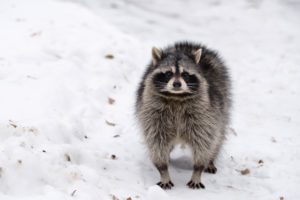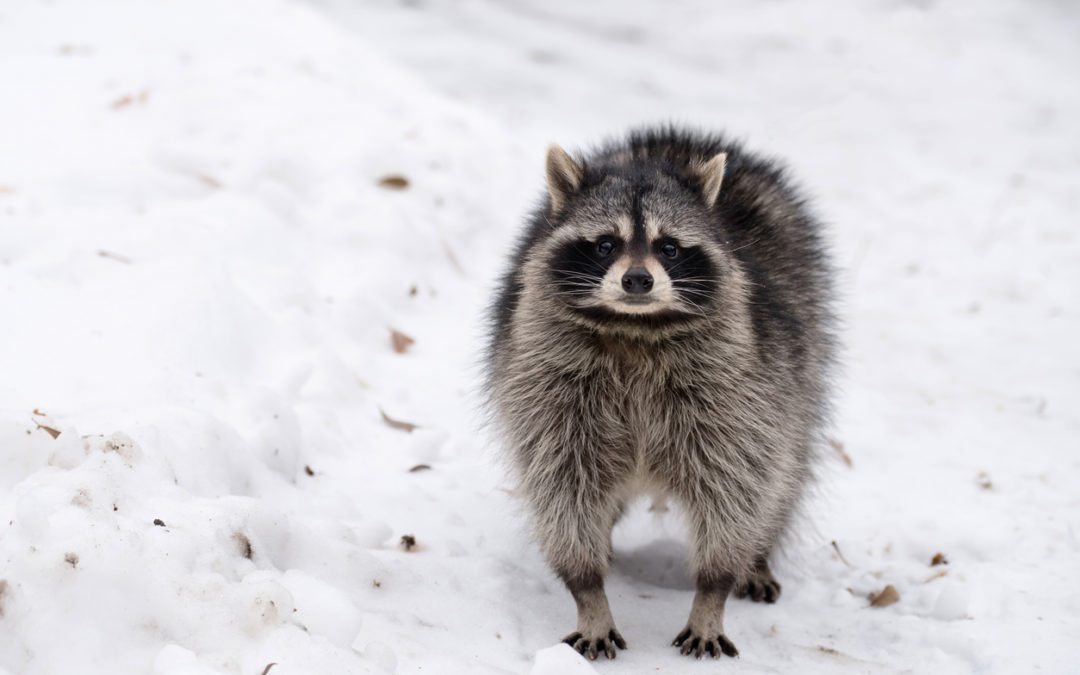As you’re pulling out your heavy coat and boots to trek through the snow, or drinking tea and hot chocolate to keep warm, you might be wondering, “What do raccoons do in the winter?” Like most mammals that don’t migrate to warmer climates in November, including humans, raccoons have methods for coping with bitter temperatures and a lack of food. This means that raccoon removal is a year-round problem.
Raccoon Survival Techniques
Beginning in the fall and continuing into the winter, wildlife companies see an increase in the number of raccoon removal jobs. In the wild, raccoons will
Unlike rodents who collect and stash large quantities of food to eat throughout the season, raccoons prepare for winter by gorging themselves on as much food as they can find. Gaining so much weight means that they will be able to survive off of their fat stores if the weather is too harsh to hunt for food. While raccoons are active during the winter and will leave their dens at night to forage on occasion, in periods of extreme snow or cold they’ll stay in for long periods of time. Some may remain inside for days or weeks at a time, and in at least one extreme raccoon removal case, ABC Wildlife dealt with a raccoon that was able to last more than two months without leaving his attic home.
To aid in enduring long periods of icy weather without regular nourishment, raccoons can enter a state called torpor. Similar to full hibernation, torpor lowers an animal’s body temperature and metabolic rate to help sustain their body’s resources for as long as possible. This means they’re not expending energy or burning calories which makes them able to last much longer between feedings. However, unlike full hibernation, animals that undergo torpor wake up and are active with greater regularity.
Increase In Activity
January through February is when mating season begins for raccoons. Homeowners often complain that they hear animals fighting in their attic, and while that is a possibility, it is much more likely this commotion is caused by breeding raccoons. Kits usually take about 9 months to mature to adulthood, so come November or December, litters born early in the year are ready to venture out to look for den sites and start families of their own. This means that there is a rise in the number of adult raccoons seeking shelter just as the cold season is beginning.
Raccoon Removal
If you notice any unusual activity on your property, particularly footprints in the snow on your roof, damage to the exterior of your house, or thumping noises in the ceiling, there’s a possibility your attic has become home to raccoons. Between tearing holes in your roof, destroying insulation, urinating and defecating, and carrying any number of diseases, these animals are capable of causing a great deal of grief. While it’s understandable that raccoons are just trying to make it through until the spring, they pose a danger to your home. Your health and safety are far too valuable to ignore. Contact a licensed raccoon removal company like ABC Wildlife right away if you experience any of the above indicators. Our trained technician will be dispatched to your property to look for entry points and set a humane-capture trap. Once the raccoons have been caught, ABC Wildlife is able to repair any damage, close up entry points, and install animal proofing to prevent future breach.
Sharing is caring! If you’ve learned something from what you’ve read, please click one of the icons below to share this post on social media.



